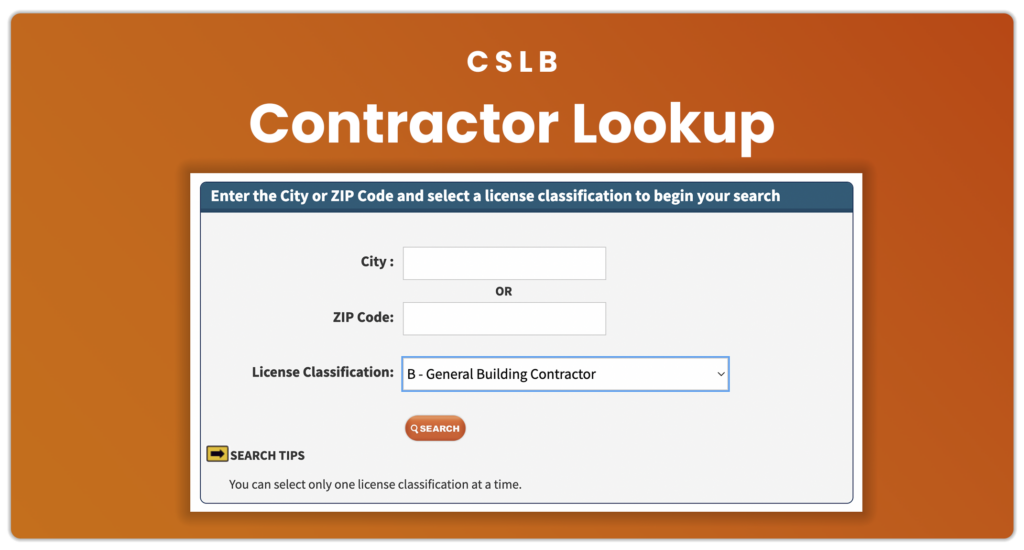
02 Nov Get a Home Remodeling Contractor’s License in California
In California, anyone who contracts to perform work on a project that is valued at $500 or more for combined labor and materials costs must hold a current, valid license from CSLB.

In California, anyone who contracts to perform work on a project that is valued at $500 or more for combined labor and materials costs must hold a current, valid license from CSLB.
Before applying for your license, make certain that you are applying for the correct one. In California, there are three types of contractor licenses. Which license you require is determined by the type of work you do.
Overpasses, underpasses, bridges, airports, power plants, pipelines, railroads, and highways are examples of Class A projects.
A Class A General Engineering License is required by the CSLB for any contractor “whose primary contracting business is in connection with fixed works requiring specialized engineering knowledge and skill.” Land leveling, earthmoving, excavating, trenching, paving, and cement and concrete work are all included.
These are major public works projects. Projects like these will typically begin under the supervision of one or more engineers employed by a large construction company or engineering firm. The contractor’s initial contact with the engineer is to make sure he understands the scope of work, the analysis process, and any special conditions that may impact safety.
The engineer overseeing the project will then assign a “subcontractor” to perform specific portions of work. The subcontractor(s) will be responsible for coordinating all aspects of the job, such as location, time, materials, and labor. The subcontractor(s) will then hire sub-subcontractors to complete specific portions of work, much like a village carpenter hires other carpenters to complete specific tasks based on their skill level.
A Class A license holder will be involved in every aspect of a Class A project from start to finish.
This type of contractor focuses on residential, institutional, or commercial buildings.
A Class B General Building Contractor License is required by the CSLB for any contractor whose primary contracting business is primarily in connection with buildings, including apartment houses, hotels, individual homes, hospitals, and all other types of structures, whether permanent or temporary. Construction of offices, stores, warehouses, apartments, resorts, and other public or private buildings is included within this classification.
A California general building contractors license allows a contractor to construct a house or a shelter as long as framing or at least two unrelated trades are performed. For example, a general contractor cannot bid and perform on a project that only requires electrical work, but the general contractor may subcontract this work to a licensed electrician. If the project requires electrical and plumbing, the general contractor can now bid and perform on this contract. As a general building contractor, you may not accept contracts that involve only one trade unless that trade is framing or the work is being subcontracted to a specialty contractor who specializes in that trade.
A Class C Specialty Contractor License is required by the CSLB for any contractor whose primary contracting business is in connection with specialty work. These are projects that require a substantial amount of planning and coordination, as well as specialized knowledge and skill. Examples of specialty work include interior designs, landscaping, and construction of new office buildings. Any work that is in the interior of a home or in contact with the public must be performed by a Class C Contractor. If you are a general contractor who may not be licensed to perform specialty work, you will need to subcontract the work you cannot perform yourself to another credentialed individual.
Class C licenses are issued for specific trades, such as electrical, plumbing, and finish (such as painting and decorating) work. A specialty contractor is one who has experience in a particular trade or craft.
Under this classification, contractors can choose any specialty field they wish to work in. The only limitation is that the specialty contractor’s license must be relevant to the project or type of work he or she will do.
You will be required to pay a number of fees, including a $330 application fee and a $200 license fee. Licenses must be renewed every two years for a fee of $450. A bond or cash deposit of $15,000 is also required. For more information on each class of registration and the associated fees, please visit the California Contractors State License Board (CSLB) website.
California has fairly simple criteria for general licensing. In order to obtain a license in California, you need to:
In California, a contractor license bond is a requirement for all contractors. Two more bonds might be needed:
There aren’t any further monetary requirements. This is done to safeguard customers from contractors who try to avoid detection by claiming they don’t make enough money to warrant a license.
Other than what is needed to reach the journey level in your trade, there are no further educational requirements.
However, the CSLB may grant credit for appropriate apprenticeships or vocational training in the form of work experience lasting up to three years. For an Associate of Arts in building or construction management or a bachelor’s degree that meets certain criteria, you can additionally obtain credit for up to 1.5 years.
Note from the CSLB: “Please be aware that there are no schools or application preparation organizations that are affiliated with or agents of CSLB, although some may have company names that are confusingly similar to CSLB. If you discover that an organization has misrepresented itself as being CSLB, you should submit a complaint to CSLB or the California Department of Consumer Affairs. Official CSLB examination study guides are available free of charge on CSLB’s website and are mailed to applicants when they are scheduled for exams.“
Contractors in California are able to work on general building projects with a Class B license. However, holding a B license as opposed to a B2 license has some noticeable differences. Each has specific prerequisites for licensing and after receiving a license, unique rights for contracting employment. Below, we go into further detail.
A general contractor who holds either of these licenses is permitted to make improvements to or remodel already-existing buildings (including drywall, finish carpentry, flooring, insulation, painting, plastering, roof repair, siding, and tiling) and to subcontract any of the trades to suitably qualified professionals.
However, only B contractors have the authority to alter or add to existing structures such as load-bearing components like walls and partitions. In addition, B2 contractors are not allowed to carry out B contract projects that require the expansion of HVAC, plumbing, or electrical systems. Last but not least, contracts under B classification may involve two or more unconnected trades, whereas contracts under B2 classification must involve three or more.
The required experience varies between the two contractor groups as well. For instance, the B license requires four years of journeyman experience performing and directing work in framing and rough carpentry, two distinct building professions. Candidates must complete four years of journeyman training in three different trades to be eligible for a B2 license; however, no prior experience in carpentry or framing is necessary.
Class B licenses are for general contractors who do construction projects that involve building or altering structures or performing all or part of the project in a location that is outside the site where the structure or alteration is being built. General contractors can also provide technical instructions (blueprints) to two-year journeymen who will perform the actual work.
State law does not explicitly specify the required qualifications for Class B general contractors. The California Contractors State License Board (CSLB) has no written licensing criteria for this classification, but CSLB regulations contain minimum educational requirements, bonding practices, and other requirements to work in California.
For a Class B general contractor’s license, you must be at least 18 years of age with four years of experience as a journeyperson in a specified trade or craft.
Most states have no formal educational requirements for contractors, but California does have some. To receive a license, individuals must complete a certain number of hours of training and education through approved schools. In California, you need to complete at least 104 hours of coursework in an apprenticeship program or one or more courses that are accepted by the California Contractors State License Board (CSLB). The courses must include classroom time, hands-on training, and work experience.
Class B general contractor licensing involves many steps, including the completion of a form and an exam. When you submit your application to the CSLB, all required material is sent to an examination center, where a designee reads and evaluates your application. If you are approved for a license, the designee will then authorize you to take a licensing exam. The exam consists of 150 multiple-choice questions that test your knowledge of construction and building laws in California. The exams are administered throughout California year-round at various testing centers. After the exam, your completed application is sent to the California Contractors State License Board, where your license is issued.
Class B general contractors are limited by state law to performing “construction and alterations” in California, which means the following:
1) A Class B general contractor may do a project in California, no matter where it is located, as long as the project falls within the scope of work that can be performed by a Class B general contractor.
The classifications for Class B general contractors differ somewhat depending on the nature of their projects. A general contractor who works primarily with residential home remodeling may need more than just a Class B license; they also may need an additional endorsement from the state’s Department of Housing and Community Development (HCD). In California, the license and HCD endorsement are generally available together.
2) A Class B general contractor may “transact business” in California as long as they do not take on its own projects. If a Class B general contractor is hired by a homeowner or home builder to do work in the state, it will have to comply with state building and safety laws. The general contractor can be licensed as a “sub-subcontractor.”
Class B general contractors are employed by businesses that act as their clients (or owners). Subcontractors include firms that provide services such as pre-construction consultation, bidding, building design, or carpentry. They may also be hired by building materials suppliers or manufacturers that are not in the general contracting business.
3) Class B general contractors can work on projects in California, regardless of whether the owner is a private individual, a public entity such as an agency, school district or local government, or a corporation. They also may provide construction consulting services to owners whose “project code” has been approved by the CSLB. The CSLB’s project codes include projects on colleges and universities, hospitals and medical facilities, prisons and other correctional facilities, state-run mental hospitals, and developmental centers for children with disabilities.
To become a contractor in California, you must first register with the California Contractors State License Board (CSLB). Once your forms have been received, you will get a response from the CSLB stating whether they have received your application or if they need additional information. If your application is approved, you will be able to take exams and purchase insurance.
The state also requires that applicants passing their exams first demonstrate that they have liability insurance as well as workers’ compensation coverage. Contractors are required to maintain these policies for their employees as well. The state also allows for alternative forms of insurance and coverage if the applicant can demonstrate that they don’t require this type of coverage. However, if your business is required by law to be insured or provide workers’ compensation for your employees, but you choose not to purchase it, you will be charged a fine.
To get a California contractor’s license, the applicant must pass three exams. The state licensing exam includes general construction questions and is administered through a testing center. The first two exams are the law exam, which cover regulations for commercial projects and residential projects, and the project management exam. Both exams are written and open books. Those who pass all three exams are then eligible for a California contractor’s license.
There is also an optional skills test that contractors may take in place of the third exam if they have proof of passing another state’s licensing exam or meet one of several other qualifications. Weighing about 50 to 70 questions, this test is an alternative way for a contractor to demonstrate their skill level.
Once an applicant has passed the first two exams, they have 60 days from the time that applies to take and pass all three exams. The exam will be administered during a four-week period in January, March, May, and July. If you fail any one section of the exam, you can take it again the following month until you pass all three sections.
Once you pass all three exams, the state will issue your license within 30 days of your successful completion of all exams.
If you are looking for information on how to become a licensed general contractor in California, look no further than this blog post. This information can help you know what to expect, as well as assist you with finding out if you need additional insurance. Although you may not have to pass the exams, your business should be prepared.
Nearly every home remodeling contractor has a home remodeling project that they want to be done. Whether it is kitchen remodeling, bathroom remodeling, or deck building, there are many options when it comes to selecting a contractor who can help you get started and complete the work on time! Kitchen remodeling can bring great value to your home in terms of design, functionality, and aesthetics. A general contractor may work to make your home’s kitchen more functional or to provide you with a completely new and stylish design. To find an eligible home remodeling contractor, the CSLB website provides a helpful lookup tool that will give you a list of licensed contractors in your area of California.

Kitchen remodeling jobs can range from simple upgrades to complete teardowns and installation of cabinets and countertops to upgrading appliances or designing new layouts for your kitchen. All of these elements will affect the cost of your kitchen remodel.
To get a better understanding of what the kitchen remodeling cost is, you will need to work with an experienced kitchen contractor. This contractor can help educate you about what type of changes are most likely to help you save money and have the most value for your home.
There are some homes that have a large number of nooks, cupboards, and closets that make it difficult for homeowners to find a place for everything. Although these homes may be smaller or in older neighborhoods, they still provide a wonderful opportunity for home renovations when homeowners are ready to renovate their “clutter-free” home into one with additional space.
Closet and pantry renovations may be more affordable than you think. The cost of renovating a closet can be $1 per square foot. This includes the installation of new doors and organizing existing pipes, wiring, insulation, and exhaust systems. These closets may measure anywhere from 2 to 10 feet wide by 6 feet deep or more.
Kitchen and bathroom remodeling is an additional project that you can include in your remodeling plan for your home. You can find some very experienced kitchen contractors who work on small jobs as well as larger such as kitchen remodeling costs. Smaller projects like these are typically completed within a few weeks and do not require the same amount of skill or experience that larger renovations do.


